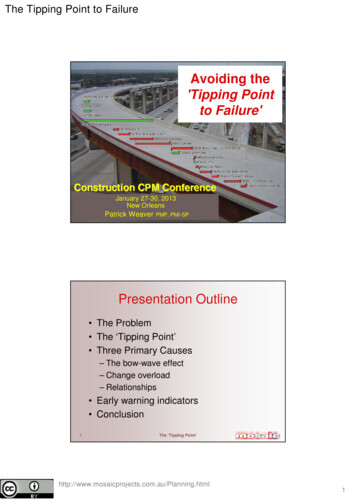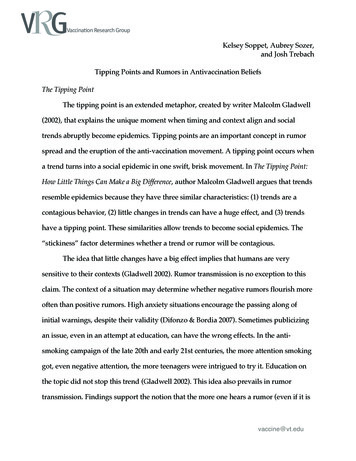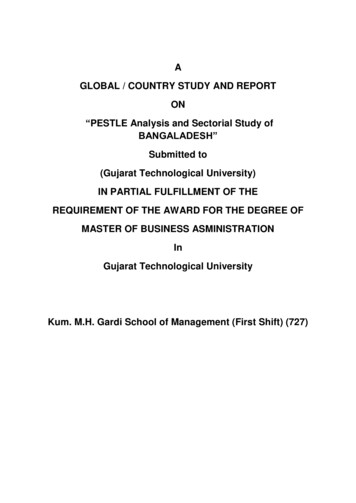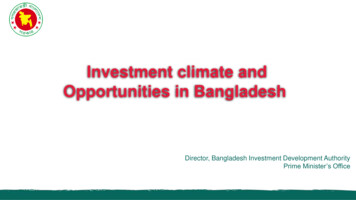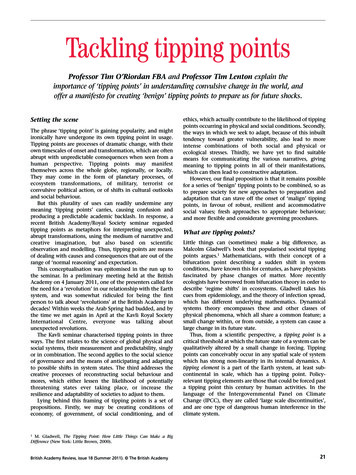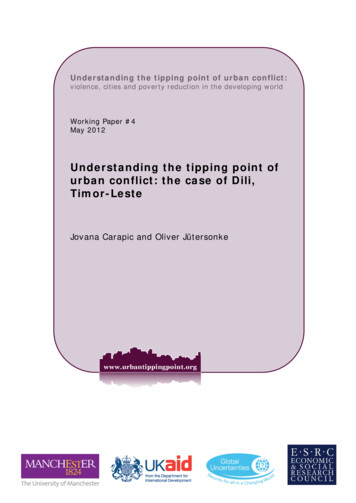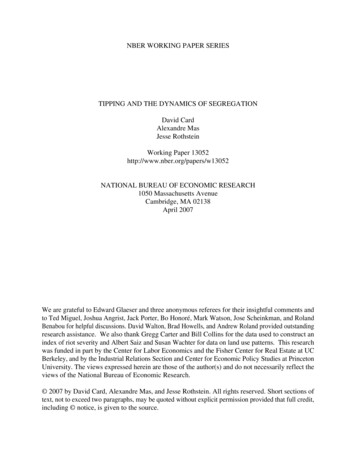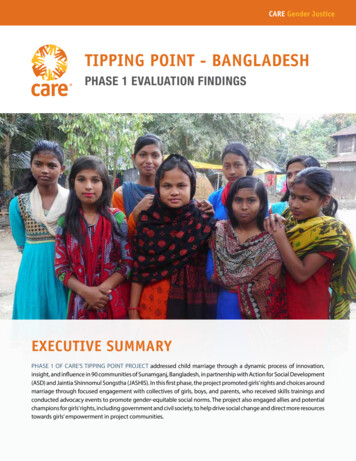
Transcription
CARE Gender JusticeTIPPING POINT - BANGLADESHPHASE 1 EVALUATION FINDINGSEXECUTIVE SUMMARYPHASE 1 OF CARE’S TIPPING POINT PROJECT addressed child marriage through a dynamic process of innovation,insight, and influence in 90 communities of Sunamganj, Bangladesh, in partnership with Action for Social Development(ASD) and Jaintia Shinnomul Songstha (JASHIS). In this first phase, the project promoted girls’ rights and choices aroundmarriage through focused engagement with collectives of girls, boys, and parents, who received skills trainings andconducted advocacy events to promote gender-equitable social norms. The project also engaged allies and potentialchampions for girls’ rights, including government and civil society, to help drive social change and direct more resourcestowards girls’ empowerment in project communities.
At the conclusion of Phase 1, an external evaluation team visited a sample of project sites to conduct datacollection with girls, boys, parents, and community members. Based on the evaluators’ findings, TippingPoint’s iterative and adaptive strategies have proven to be effective in supporting social norms that promotegender equity. Among the results:Girls gained psychosocial skills, knowledge of their rights, social capital, and increased confidence. Safespaces established by the project brought adolescent girls together, and life skills education raised theirawareness of their rights and their abilities to effectively advocate for themselves. The evaluation found thatgirls had a thorough understanding of how gendered social norms affected their lives and were speakingup to defend themselves against harassment and express their opinions. Through activities like football anddrama troupes, girls discovered their power to win new, although limited, freedoms to be active and visiblein public despite some negative reactions in the communities. Girls still lacked agency in many areas of theirlives, but there was significant evidence of girls reaching out to adult allies in the community for supportnegotiating with parents to stay in school, delay marriage, participate in project activities, or address safetyconcerns. The dreams and aspirations of girls became more focused on meaningful careers and equitablerelationships in a future marriage. With new knowledge in menstrual management, nutrition, and livelihoods,adolescent girls in project groups were well respected, and many of them were successful advocating forresources and support from local government authorities.22019 : TIPPING POINT - BANGLADESH
Girls’ mobility and visibility increased significantly. Throughproject activities, girls spent more time outside their homesand gained greater freedom of movement. Platforms createdby girls’ football and project community events raisedthe profile of girls in their villages, and beyond, as teamstraveled to compete, drama groups toured, and the projectfacilitated participation in outside conventions and trainings.Girls’ greater visibility faced some backlash from communitymembers and religious figures, but adolescents grew moreresilient and determined in the face of such sanctions.The possibility of relationships with boys and elopementscontinued to animate parents’ fears of losing family honor; atthe same time, it became socially acceptable for girls and boysto mingle in the project’s meeting spaces.Parent-adolescent relationships improved, and parents wereless concerned with family honor. Tipping Point fosteredbetter communication between parents and children throughdialogues and special events. Parents reported enjoying theiradolescent children more, and girls spoke of greater trust andopenness in their relationships. Perhaps because parents,mothers especially, became better listeners and valuedgirls’ voices more, parents who had daughters participatingin Tipping Point were less concerned with family honor,which is closely linked to girls’ behavior, than other parentsin the communities. These mothers also seemed to play amore balanced role in decision making with fathers aboutdaughters’ lives, and parents of girls who joined Tipping Pointgroups displayed some non-normative behavior, such asbetter chore-sharing between men and women in the home.Key norms loosened for some groups. Dowry was consideredless acceptable among individuals who had been exposedto Tipping Point’s messages, and it became a point of pridefor girls in project groups to speak out against dowry. Theeducation of girls, following a trend that pre-existed theproject, became more normal, and there was less concernabout girls being overly educated. Some respondents evensaid that the idea of a “good” girl had transformed to includethat girls advocate for themselves and share their knowledge.Boys who joined Tipping Point groups began challengingnorms of male dominance in the home and were more likelyto take on household work normally done by their sisters orPhase 1 Evaluation Findings3
mothers. They also showed some change in their hopes for marriage and stressed equitable decision makingbetween spouses.Strong allies for girls emerged in project villages. By the end of Phase 1, girls came to know that they couldrely on members of Ending Violence Against Women (EVAW) Forums, local volunteer groups that met regularlywith adolescent cohorts. EVAW Forums advocated for girls both collectively with local government, services,and religious leaders, and individually, intervening with a girl’s family, school, or perpetrators of harassment tosolve barriers to staying in school, delay or cancel a planned marriage, or guard girls’ bodily autonomy. Severalallies for girls also emerged from among religious clerics who authorize marriages and government officialsmanaging budgets or overseeing schools, although support from these groups was less consistent.Project staff transformed their assumptions about men, women, work, and how to lead change. Becauselocal staff were the faces of Tipping Point, the ones who sparked change, the project prioritized fostering theirown internal conscientization on gender and other topics. Through workshops and personal reflections, staffbecame aware of the role of gender in shaping their lives and discovered new capabilities in leading personaland social change. The topics of sexuality and bodily autonomy were especially valued by staff, most of whomhad never talked about such things before. Because community members witnessed the personal growth ofproject staff and their fortitude in withstanding criticism from villagers for their work, staff came to be seenas role models.In just a few years, Tipping Point made significant progress in mobilizing advocates for girls’ rights and in shiftingsocial norms related to child marriage in Bangladesh. It was difficult to measure the impact of Tipping Point onthe practice of child marriage itself, but there were many stories of marriages averted through the interventionof parents, boys, and girls involved with the project or in conjunction with EVAW Forums.The successes of Tipping Point to date have not overcome the many barriers girls continue to face in realizingtheir potential and achieving agency in key life decisions. But they are successes that hold promise for theapproach the project takes to social norm change and girls’ empowerment because they demonstrate thatactivities that rupture traditional social norms in safe, public environments are effective in shifting attitudesand giving people permission to think and behave differently. In addition, the project piloted new ways ofoperationalizing social norm change work, with programming according to a set of principles that includefocusing on positive messages about girls rather than the negative outcomes of child marriage.1 Tipping Pointalso deployed innovative measures of social norms and normative change that can inform academic andprogram design thinking, such as the SNAP tool.A key challenge for Tipping Point in its second phase will be to engage a broader range of community membersand to engage parents and boys more intensively in collective action activities. Fathers and boys were moredifficult to mobilize and need creative approaches to their participation. The strength of girls’ groups can beexpanded with networking activities between villages. Legal and quasi-legal structures such as arbitrationbodies present platforms of intervention in individual girls’ cases, and involvement with them seems a logicalextension of the role that EVAW Forums have played to date. Additionally, religious leaders have great influencein project sites and should not be assumed to be homogeneous opponents of change.14See the Social Norms Programming Principles in the Innovation Briefs at https://caretippingpoint.org/innovation/.2019 : TIPPING POINT - BANGLADESH
PROGRAM RECOMMENDATIONSRECOMMENDATIONS FOR GIRLS’ EMPOWERMENT AND SOCIAL NORMS PROGRAMMINGBUILD GIRLS’ SKILLS IN NEGOTIATING ROMANTIC RELATIONSHIPS AND SEXUAL ACTIVITYIt is expected that there would be community resistance to adding more explicit content to skill sessionswith adolescent girls’ groups. As an alternative, look for creative ways to incorporate transferable skills thatcould be applied to romantic or sexual relationships, such as consent, refusal, decision-making, and safetyplanning. Parents may also be more willing to allow comprehensive sexuality education if they are exposedto it themselves.INVOLVE MORE GIRLS IN FUN CENTER ACTIVITIESIf capacity is an issue, consider adding circles of membership, so that additional adolescents can participateat some level. For example, a wider group could join in planning and organizing community events, or coremembers could facilitate peer groups.Phase 1 Evaluation Findings5
FIND CREATIVE WAYS TO ENGAGE FATHERS AND MENBuild on activities that men found interesting and that built their relationships with their daughters. Considergiving more fathers specific roles at Fun Centers, even minor roles, so that they feel their participation isimportant.ADDRESS SOCIAL MEDIA SKILLS AND MOBILE PHONE TECHNOLOGYAs users of internet technology, youth need skills in recognizing unfamiliar threats and knowing how toprotect themselves online. If boys are the primary users in project areas, they should be aware that theirbehavior online can have impacts on others in the real world.EXPAND FINANCIAL LITERACY AND LIVELIHOOD OPPORTUNITIES FOR PROGRAMPARTICIPANTSGirls who earn income and contribute to their families may be more successful at delaying marriage. TippingPoint connected many girls to livelihood skills trainings and may consider building adolescents’ skills infinancial literacy, savings, and banking more directly.INTENSIFY COMMUNITY DIALOGUE EVENTSEvents like the community talk show, drama performances, and cooking competitions drew in large crowds.More frequent activities like these will expand the project’s reach and deepen the impact on observers,especially when dialogues are well facilitated. The project may wish to tailor events to certain audiences,such as fathers or elders.BUILD GIRLS’ NETWORKS OUTSIDE THEIR VILLAGESThe football tournament gave girls exposure to other villages and other peers. Work with family membersand community leaders to create safe, acceptable reasons for girls to travel and socialize with each other, sothat their social networks and sense of solidarity grow.MAKE INROADS IN FORMAL PROCESSES OF ARBITRATIONSeek collaboration with the officials and religious authorities that conduct arbitration. EVAW Forum memberswould be well placed to liaise with them to create a role in arbitration processes for a girl’s advocate.REVISIT THE INVOLVEMENT OF MARRIED ADOLESCENTSBecause they face the greatest restrictions, adolescent girls who have already married are likely to miss outon activities that are not designed and targeted expressly to them. Their particular points of view, needs,and wishes are not well represented in the evaluation data and therefore it is difficult to understand the62019 : TIPPING POINT - BANGLADESH
project’s relationship to them as a group. Tipping Point could support married girls more in continuing theireducation, negotiating within their households, and by working with husbands and in-laws to promotemarried girls’ rights.FIND RELIGIOUS LEADERS OPEN TO SUPPORTING GIRLS’ RIGHTSReligious leaders can be challenging to work with, yet they make impactful allies in socially conservativecommunities. Find the leaders that have at least some stances in common with the project and build onthose relationships. If there are progressive Muslim or Hindu organizations active in Bangladesh, considerways to link local leaders to them.FOLLOW GIRLS’ INTERESTSAsk girls to identify what activity they would like to start doing and be ready to support it in the same waythat the project and its allies supported girls’ football. For example, some girls expressed interest in musicand singing, although they are frowned on for girls. The project could lend its credibility to new activities toexpand what is seen as acceptable behavior for girls.Phase 1 Evaluation Findings7
POLICY RECOMMENDATIONSCLARIFY ‘SPECIAL CIRCUMSTANCES’ FOR MARRIAGE UNDER 18 TO ENSURE GIRLS’ CHOICESARE RESPECTEDThe provision of the Child Marriage Restraint Act (2017) allowing a girl or boy to get married before 18 under“special circumstances” has the potential to be abused and to undermine ongoing efforts to address childmarriage. The government should put in place administrative rules or measures that clarify the circumstancesunder which the exemption applies, as well as develop clear procedural/legal measures to uphold girls’choice and consent in marriage decisions.82019 : TIPPING POINT - BANGLADESH
ENSURE GIRLS’ RIGHTS ARE PROTECTED IN COMMUNITY ARBITRATION PROCESSESThe evaluation found that families often turn to legal or quasi-legal arbitration processes to addresspotentially shameful situations involving girls, including rape, domestic violence, consensual extramaritalrelationships, and marriage dissolution. To ensure good outcomes for girls, the government shouldmandate safeguards within arbitration processes aimed at protecting girls’ rights and autonomy withinthese processes.INVEST IN FORMAL EDUCATION AND SKILLS TRAINING FOR GIRLS AND YOUNG PEOPLE INMARGINALIZED COMMUNITIES TO EXPAND CHOICES AND CREATE ALTERNATIVES TO CHILDMARRIAGEThe government should expand and promote girls’ access to both formal and non-formal education, trainingand livelihood opportunities. Girls who earn income and contribute to their families may be more successfulat delaying marriage. Skills training strategies should include diverse ways to connect young peoplefrom remote and marginalized communities to vocational, livelihoods, and employment opportunitiesand markets and supporting infrastructure and access to services and programs that can transform thegeographic isolation of communities.IMPROVE SERVICES FOR MARRIED GIRLSThe government should target already married adolescent girls with increased access and opportunitiesfor education, health services, livelihood opportunities, and financial resources. Married adolescent girlsare among the most vulnerable members of society, and dedicated efforts to reach them are necessary toguarantee their rights are fulfilled.IMPROVE ACCESS TO SERVICES THROUGH INFRASTRUCTURE SOLUTIONSThe government should invest in infrastructure that improves mobility and access for adolescents, especiallygirls, in isolated communities. Communities in the haor region are subject to cyclical flooding that exacerbatestheir geographical isolation and disrupts girls’ educations. Government-supported solutions to infrastructurelimitations will enable greater access of girls and their families to essential services.INTEGRATE AND SCALE UP STRATEGIES TO CHANGE DISCRIMINATORY NORMS AS PART OFGOVERNMENT PROGRAMSThe findings of the evaluation show the promise of approaches aimed at shifting discriminatory norms andexpanding community perceptions of the potential roles and contributions of girls to their communitiesbeyond household duties. Civil society organizations need support to scale up community-based efforts toshift norms through the promising approaches and strategies highlighted by the evaluation. This includesengagement of religious leaders and other influential stakeholders.Phase 1 Evaluation Findings9
www.care.orgCARE USA151 Ellis Street NEAtlanta, GA 30303USAwww.care.orgCARE BangladeshRAOWA Complex (Level 7-8)VIP Road, MohakhaliDhaka - 1206Bangladeshwww.carebangladesh.orgFounded in 1945 with the creation of the CARE Package, CARE is a leading humanitarian organization fighting global poverty.CARE places special focus on working alongside poor girls and women because, equipped with the proper resources,they have the power to lift whole families and entire communities out of poverty. Last year CARE worked in 93 countriesand reached 63 million people around the world. To learn more, visit www.care.org.This initiative is funded byPHOTO CREDITS: Tipping Point Photovoice 2017102016 : The Cultural Context of Child Marriage in Nepal and BangladeshJANUARY 2019
daughters' lives, and parents of girls who joined Tipping Point groups displayed some non-normative behavior, such as better chore-sharing between men and women in the home. Key norms loosened for some groups. Dowry was considered less acceptable among individuals who had been exposed to Tipping Point's messages, and it became a point of pride
